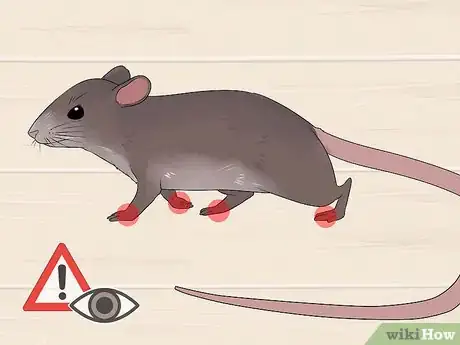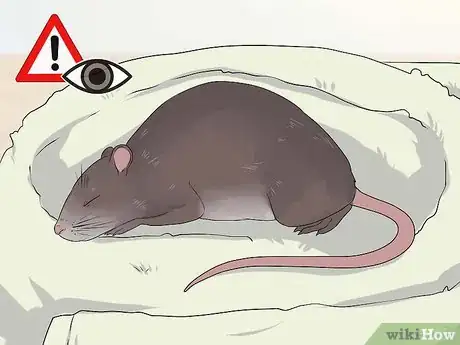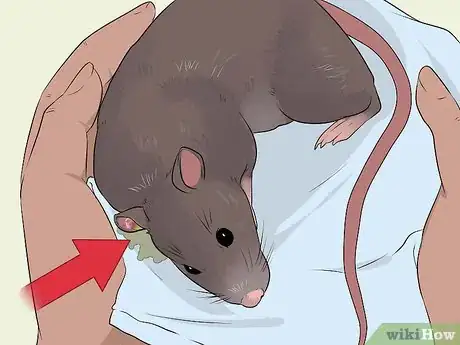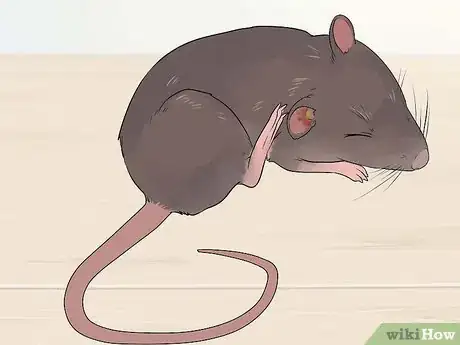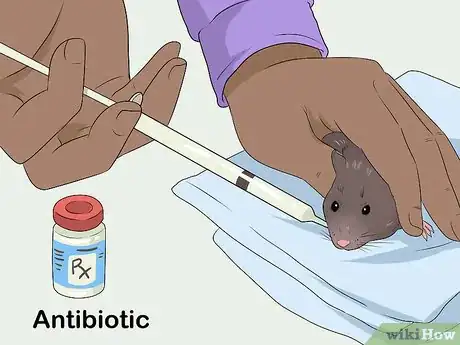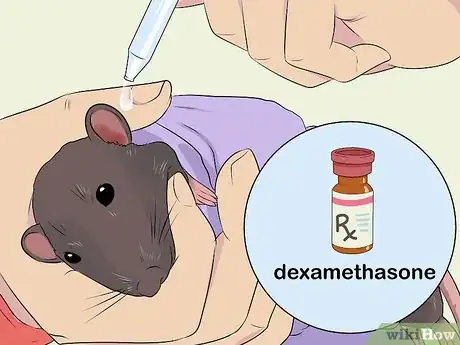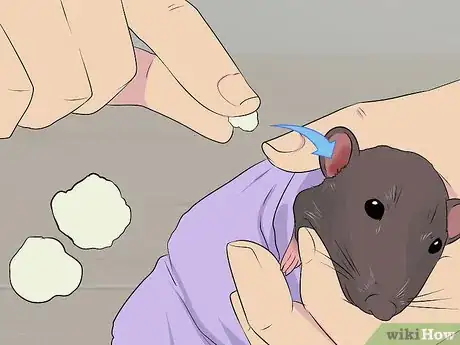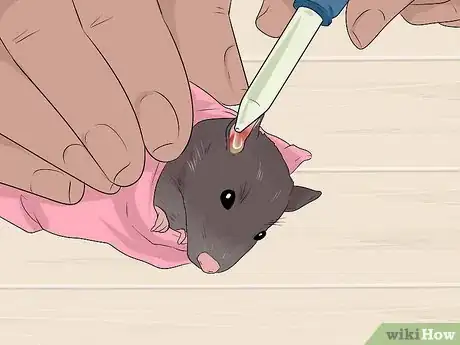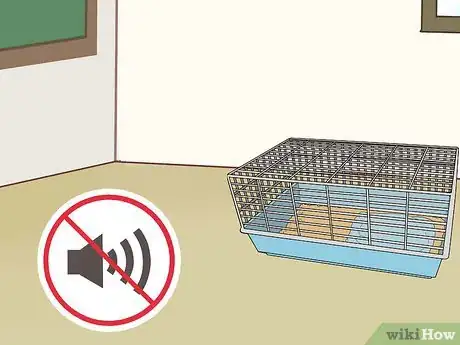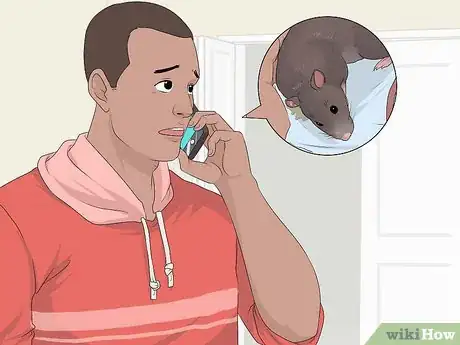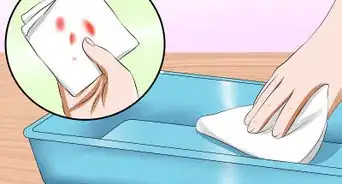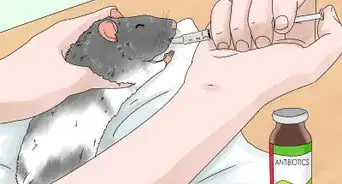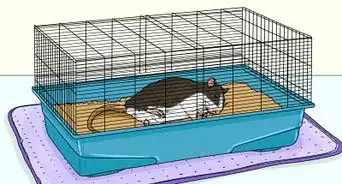This article was co-authored by Pippa Elliott, MRCVS. Dr. Elliott, BVMS, MRCVS is a veterinarian with over 30 years of experience in veterinary surgery and companion animal practice. She graduated from the University of Glasgow in 1987 with a degree in veterinary medicine and surgery. She has worked at the same animal clinic in her hometown for over 20 years.
There are 7 references cited in this article, which can be found at the bottom of the page.
This article has been viewed 52,622 times.
Rats are great pets. Not only are they intelligent, but they’re highly social. Like all pets, rats suffer from a variety of ailments, including ear infections. Unfortunately, ear infections can be difficult to treat in rats. But by knowing the symptoms of an ear infection, seeking the help of your vet, and taking care of your rat while it recovers, your little friend should be back to normal in a few weeks.
Steps
Diagnosing Ear Infections
-
1Look for a lack of balance. Watch your rat to see if it seems to be off balance. If your rat has trouble walking straight or doing things it normally does, this could be an indication that your rat has an ear infection.[1]
-
2Watch for lethargy. While being tired or lacking energy doesn't by itself mean that your rat has an ear infection, combined with other symptoms, it may. If your rat seems to be tired and is less active than normal, you should contact your vet.[2]Advertisement
-
3Note if your rat tilts its head to one side. If you notice your rat tilting or leaning its head to one side, your rat probably has an ear infection. Head tilt is one of the most notable and symptoms of ear infection in rats. If your rat has a head tilt, you need to contact your vet immediately.[3]
-
4Look for drainage from the ear. Rats with ear infections may have bad-smelling liquid draining out of their ear. Typically, if a rat has drainage coming from their ear, their infection is somewhat more advanced. If you notice drainage from your rat’s ear, contact your vet as soon as you can.[4]
-
5Watch to see if your rat scratches its ear more than normal. If your rat has an ear infection, it will probably scratch or touch its ear more than it does regularly. This is a sign that your rat is uncomfortable and needs to visit the vet.[5]
Working with a Veterinarian
-
1Schedule an appointment with your vet immediately. Make an appointment with your vet when you first suspect your rat has an ear infection. To prevent long-term problems for your rat, you need to make sure your rat’s ear infection is treated as quickly as possible. Don’t worry, though, your vet will do everything they can to help your rat.[6]
- Your vet will ask you questions about your rat’s health and symptoms.
- They’ll examine your rat.
- They might run diagnostics like blood tests to see the extent of a possible infection.
-
2Talk to your vet about the cost of treatment. Because the treatment of ear infections may be an involved process, you should ask your vet for an estimate of the treatment cost. Without asking first, you may be shocked at how much you wind up paying after a couple of visits. Ask your vet if they:
- Offer a payment plan option.
- Have suggestions about where to purchase medicine and other supplies at a discounted price.
- Know another vet who may be able to treat your rat for less, like a budget animal clinic.
-
3Give your rat antibiotics orally or by injection. If your vet prescribes antibiotics, you’ll need to use a syringe or dropper to orally administer the antibiotics, or you'll need to follow your vet's instructions to inject the antibiotics. Antibiotics will help kill the bacteria that is causing your rat’s ear infection.[7]
- Make sure to complete the course of antibiotics. If you don’t, the infection could get worse.
-
4Put ear drops in your rat’s ear with a dropper. In addition to antibiotics, your vet may prescribe medicated ear drops to fight the infection. Medicated ear drops will also help reduce the discomfort your little friend is experiencing during its ear infection.[8]
-
5Give your rat anti-inflammatories orally or by injection. Your vet may also prescribe anti-inflammatories for your rat. Anti-inflammatories are long-acting steroids that can help reduce inflammation resulting from the infection.
- If your vet prescribes your rat oral anti-inflammatories, you'll need to use a syringe or dropper to administer the drops into your rat's mouth.
- Never put anti-inflammatories in your rat's ear.
-
6Drain your rat's ear with a cotton wick. If your vet recommends it, create a thin wick out of cotton balls or soft paper towels. Then, insert the wick a little bit into your rat's ear. Don't push it hard. Simply place it into the ear and withdraw it. If the wick is dirty when you take it out, discard it and create another.
- Avoid pushing the wick into your rat's ear with force. This could damage your rat's ear drum or compact any wax or other debris.
- Don't use Q-tips or cotton swabs to clean your rat's ears.
- If you're nervous about cleaning your rat's ear, ask your vet to do it.[9]
-
7Flush your rat's ear with a dropper. Your vet may recommend an ear flush. Typically, you'll have to flush your rat's ear every day. To flush your rat's ear, use the dropper that comes with the specific product and follow the directions your vet gives you. The amount of flush you will use depends on the specific product.[10]
-
8Take your rat to the vet to get a culture if the infection persists. If antibiotics, ear drops, and anti-inflammatories aren't helping with your rat's ear infection, your vet may want to do a culture on the discharge from your rat's ear. The culture will tell the vet which kind of medication will be the most effective to help clear the infection up.
Caring for Your Rat at Home
-
1Feed your rat a nutritious diet. Give your rat a diet that is rich in vitamins and nutrients. A proper diet can help your rat’s immune system fight off ear infections. When feeding your rat, remember that:[11]
- Commercially formulated rat food should have about 20% fat content.
- Rats should eat fruits and vegetables on a regular basis. Good fruits and vegetables to give your rat include apples, bananas, berries, carrots, broccoli, and cucumbers.
- Rats will also benefit from cheese (given as a treat every day or two). However, make sure to give your rat plain cheese, like American or Swiss.
- If your rat won’t eat, tempt it with unsalted roast beef, chicken, or turkey.
-
2Provide your rat with plenty of liquids to drink. Put a second water bottle or bowl in your rat’s cage. In addition, mix a non-citrus fruit juice (like apple juice) with Pedialyte and put some of the mixture in another water bottle in the cage. This mixture should be at a ratio of 1 to 1. By giving your rat extra liquids, you’ll increase the chances that your little friend will make a quick and full recovery.
- Discard and refresh the fruit juice and Pedialyte mixture every 6 to 8 hours.
- Don't give your rat more than 2 to 4 ounces of juice mixture every day.
- Consult your vet before giving anything other than water to your rat.
-
3Relocate your rat's cage to a warm room. Aim for a room with a temperature of 80 °F (26.7 °C) (27 Celsius). Cooler temperatures could limit your rat’s ability to recover quickly from its ear infection. In addition, cool or cold temperatures may make your rat uncomfortable.[12]
- Consider placing a reptile heat rock or pad in your rat’s cage while it is sick. This way, it’ll be able to get extra heat if it wants.
-
4Move your rat’s cage to a quiet area. In addition to moving your rat’s cage to a warm area, make sure that it is in a quiet place. When your rat is sick, it will probably want to rest a lot. If it is noisy in the room, your rat won’t be able to rest.
- Relocate your cage from a family room, kitchen, or child’s room to an office, unused bedroom, or another quiet area of your home.
-
5Clean your rat’s cage every week. While you should do this under normal circumstances, it is especially important when your rat is fighting an illness. When cleaning your rat’s cage out:
- Discard and replace substrate (wood shavings or whatever you use to cover the bottom of the cage).
- Wash out the cage with warm water and a mild dish detergent.
- Soak plastic toys and other plastic items in warm/soapy water.
- Launder fabric bedding and cloth (plush) toys.[13]
- Clean any urine or droppings in the cage at least once a day.
-
6Stay in contact with your vet. Schedule a follow up appointment with your vet after one or two weeks. In addition, call your vet if your rat’s health is getting worse after several days of treatment. The more closely your vet monitors your rat’s condition, the better they’ll be able to help it.
-
7Prevent future ear infections by treating illnesses immediately. Ear infections in rats often develop as secondary infections. As a result, all infections should be treated as soon as you notice symptoms. Contact your vet immediately if your rat shows signs of any type of infection.
- Pay special attention to respiratory infections. Common signs include difficulty breathing, sneezing, and lethargy.
- Look for eye infections. Eye infections can quickly spread to your rat's ears. Signs include red eyes, runny or watery eyes, or green or other color discharge from your rat's eyes.[14]
- Treat skin infections. Untreated skin infections could lower your rat's ability to resist other infections, like ear infections.
Expert Q&A
-
QuestionAre rat ear infections contagious?
 Pippa Elliott, MRCVSDr. Elliott, BVMS, MRCVS is a veterinarian with over 30 years of experience in veterinary surgery and companion animal practice. She graduated from the University of Glasgow in 1987 with a degree in veterinary medicine and surgery. She has worked at the same animal clinic in her hometown for over 20 years.
Pippa Elliott, MRCVSDr. Elliott, BVMS, MRCVS is a veterinarian with over 30 years of experience in veterinary surgery and companion animal practice. She graduated from the University of Glasgow in 1987 with a degree in veterinary medicine and surgery. She has worked at the same animal clinic in her hometown for over 20 years.
Veterinarian Bacterial infections are not usually passed between rats. However, other causes of infections, such as ear mites, are highly contagious and can be passed between cage mates.
Bacterial infections are not usually passed between rats. However, other causes of infections, such as ear mites, are highly contagious and can be passed between cage mates. -
QuestionWhy do rats head tilt?
 Pippa Elliott, MRCVSDr. Elliott, BVMS, MRCVS is a veterinarian with over 30 years of experience in veterinary surgery and companion animal practice. She graduated from the University of Glasgow in 1987 with a degree in veterinary medicine and surgery. She has worked at the same animal clinic in her hometown for over 20 years.
Pippa Elliott, MRCVSDr. Elliott, BVMS, MRCVS is a veterinarian with over 30 years of experience in veterinary surgery and companion animal practice. She graduated from the University of Glasgow in 1987 with a degree in veterinary medicine and surgery. She has worked at the same animal clinic in her hometown for over 20 years.
Veterinarian A head tilt can be a serious sign which needs veterinary treatment. A common cause is an ear infection, which can track deep and affect the rat's balance. Sadly, other causes include a pituitary tumour in the brain.
A head tilt can be a serious sign which needs veterinary treatment. A common cause is an ear infection, which can track deep and affect the rat's balance. Sadly, other causes include a pituitary tumour in the brain. -
QuestionCan a rat have a stroke?
 Pippa Elliott, MRCVSDr. Elliott, BVMS, MRCVS is a veterinarian with over 30 years of experience in veterinary surgery and companion animal practice. She graduated from the University of Glasgow in 1987 with a degree in veterinary medicine and surgery. She has worked at the same animal clinic in her hometown for over 20 years.
Pippa Elliott, MRCVSDr. Elliott, BVMS, MRCVS is a veterinarian with over 30 years of experience in veterinary surgery and companion animal practice. She graduated from the University of Glasgow in 1987 with a degree in veterinary medicine and surgery. She has worked at the same animal clinic in her hometown for over 20 years.
Veterinarian A stroke is caused by a blood clot interrupting the blood supply to part of the brain. This is possible in most mammalian species, including rats. The signs include sudden loss of balance, weakness, and eyes that tick from side to side.
A stroke is caused by a blood clot interrupting the blood supply to part of the brain. This is possible in most mammalian species, including rats. The signs include sudden loss of balance, weakness, and eyes that tick from side to side.
References
- ↑ http://www.ratcentral.com/8-common-rat-illnesses-to-look-out-for/
- ↑ http://www.ratcentral.com/8-common-rat-illnesses-to-look-out-for/
- ↑ http://www.ratcentral.com/8-common-rat-illnesses-to-look-out-for/
- ↑ http://ratguide.com/health/auricle_ear/otitis_media_otitis_interna_labyrinthitis.php
- ↑ http://ratguide.com/health/auricle_ear/otitis_media_otitis_interna_labyrinthitis.php
- ↑ http://ratclub.org/ratcare_health.htm
- ↑ http://www.peteducation.com/article.cfm?c=18+1804&aid=2905
- ↑ https://www.petcha.com/treatments-for-rat-with-an-ear-infection/
- ↑ http://ratguide.com/health/auricle_ear/otitis_media_otitis_interna_labyrinthitis.php
- ↑ http://ratguide.com/health/auricle_ear/otitis_media_otitis_interna_labyrinthitis.php
- ↑ http://www.peteducation.com/article.cfm?c=18+1804&aid=2905
- ↑ http://www.ratfanclub.org/cool.html
- ↑ http://animals.mom.me/way-clean-pet-rats-cage-1766.html
- ↑ http://ratguide.com/health/auricle_ear/otitis_media_otitis_interna_labyrinthitis.php
About This Article
To determine if your rat has an ear infection, monitor it for lethargy, lack of balance, head tilting, ear drainage, and scratching. If you notice any of these symptoms, take your rat to the vet as soon as possible so they can diagnose the issue and recommend the best treatment plan. The vet will likely prescribe antibiotics, and they might give you medicated eardrops to put in your rat's ear to reduce its discomfort. Additionally, the vet may prescribe anti-inflammatories to reduce inflammation from the infection. Once you bring your rat home, you should move its cage to a quiet, warm room while it recovers. You should also clean out its cage to remove any germs. For tips on how to prevent ear infections in rats from our Veterinary co-author, scroll down.
